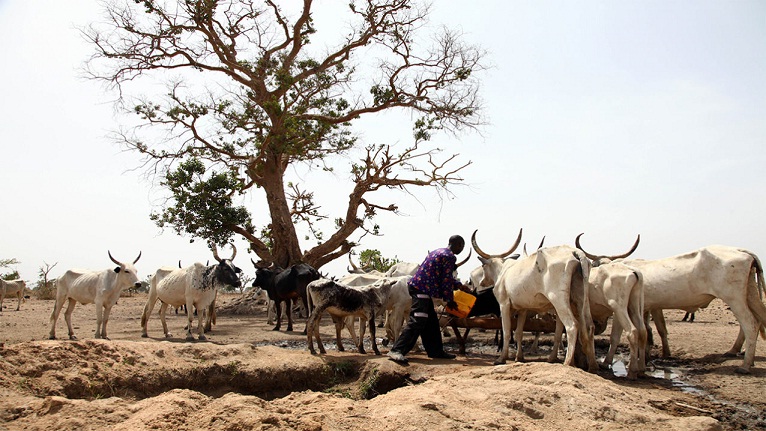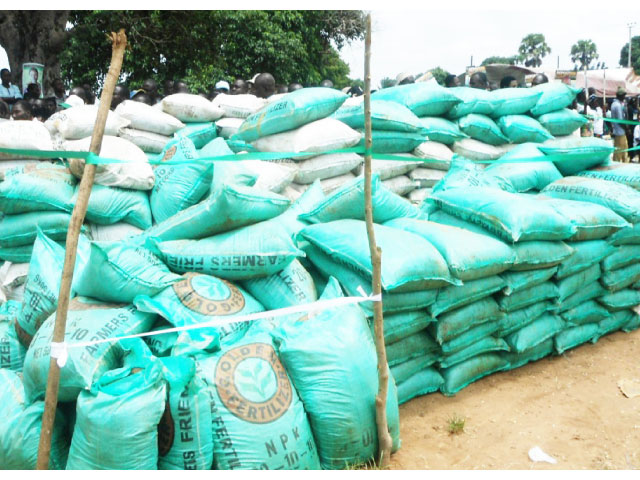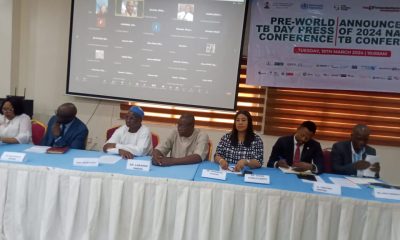Agriculture
RUGA Gets N2.2bn in 2019 Budget

By Mathew Dadiya, Abuja
The Senior Special Assistant to the President on National Assembly (Senate) Matters, Senator Ita Enang has called on States in the southern part of the country to support the implementation of the proposed Ruga cattle settlement programme by making land available.
The Presidential aide disclosed that a whopping N2.
258 billion was provided for the implementation of the Ruga programme in the 2019 budget.Enang is who made the appeal at the weekend when he hosted Students of Law School Abuja from Akwa Ibom State, said that the word – Ruga is not derived from Hausa or Fulani, but an acronym for Rural Grazing Area (RUGA) initiated in 1956 during the colonial era and is not intended to islamize, fulanized or colonize anybody.
Supporting his claims, Enang cited the 2019 federal budget, volume 1 under the ministry of agricultural and rural development item number ERGP 5208 where the sum of N2.258bn was provided and budgeted for the grazing programme.
He maintained that the national assembly members are not against the Ruga programme because they aware of it and had been approving funds for it’s implementation.
Besides the over N2 billion appropriated for the Ruga there were also budgeted sum of N300 million for water sanitation, N400 million development for sweet potatoes, N350 million for ginger development amongst several other budgeted.
He said that the ruga policy is just one component of the budget under the ministry of agriculture.
Though President Muhammadu Buhari had ordered the suspension of the Programme following a widespread protest against the implementation of the Programme in most states across the country especially in the middle belt and southern region.
But the presidential aide stressed that the objective of the budget for ruga is to promote cattle breeding and meet production.
He explained that the ruga programme is an integrated farm system which has schools, good road, tractors and mechanisatiom, agricultural integration.
with a provision for primary healthcare, vetinery, schools.
Senator Enang callee on the governor of Akwa Ibom State to also provide land for the establishment of RUGA in the states while urging the federal government to include his state amongst the benefiting states.
He, however, disclosed that asides the budgeted sum for Ruga in the 2019 expenditure, there is another sum provided for the emergency Ruga implementation programme approved in May by the National Economic Council for states that will make land available.
Enang said that since 1999 he has been hosting students of Law School from Akwa Ibom State but this was specifically to enlighten them on the objective of Ruga programme against the misconceptions making the orunds .
Enang served in the House of Representatives from 1999 to 2011, the elected senate in 2011 to 2015 and appointed SSA to the President on National Assembly (Senate) matters to date.
”One of the rumours was that President Buhari was going to acquire land people’s feed cow, ” he said.
He asked the law students one after the other what they know about Ruga and each and everyone gave his view on the issue.
Some said they have not known much about the real issue because government was yet to enlighten them on it.
Senator Enang said that Ruga is not a Hausa or Fulani word but an acronym for Rural Grazing Areas.
According to him the Ruga programme started in Nigeria since 1956, adding that it is not only for rearing cattle but farming and rearing of other animals.
”Ruga is not a plan to seize land from people neither and it’s not meant to fulanize or colonize anybody.
”The Programme is meant to address the issue of cattle roaming and destruction of farmland which would put an end to the herders/farmers crisis, ” Enang explained.
According to the presidential aide, people in the south have farm settlements and plantations which he equates to Ruga.
”The idea of Ruga graduated in 1978 into the Land Use Act which states that a portion of land has to be reserved for grazing to avoid the destruction of farm produce by cattle.
”Over time cattle roamed and destroyed farms hence the introduction of the policy to address the issue, ” he said.
He noted that in places like the north, earth dams were constructed to cater for cattle.
He expressed shocks over the inability of some states governors to understand the policy.
One of the first Ruga programmes is Obudu Cattle Ranch and the Yankari Games Reserve.
He said that every year there has been allocation for the continuous funding of grazing areas.
The height of the herders/farmers crisis led to the introduction of the ruga policy May 8, by the federal government mostly in the middle belt region and some states in North east and north west.
He said that it was the National Economic Council (NEC) that approved the establishment of the emergency Ruga policy but wondered by some governors were denying been part of the approval.
The FG is not any way trying to takeover anybody’s land for ruga adding that land under the land use act is on the hands of state government.
He faulted the claims by some governors that it was meant to Fulanize peole.
He said that the emergency ruga programme did not involve any state in the South East, South West and the South South because the areas that had the problems were about 10 states mainly North Central, and few states in North West and North East.
Responding to questions from the law students he said in most places wealth is measured by the number of cattle one has.
Senator Enang said that people in the southern part of the country preferred the local cow because it’s more nutritious than the ones brought from the north.
He urged the states in the south to open up their lands for ruga.
He said those in the habit of abusing their leaders who buy into the ruga programme are not well informed on the policy adding that their representatives in the national assembly unanimously passed the budget for Ruga and the ministers from all the states of the federation also approved the ruga at NEC.
He further highlighted that each state has a representative at the Federal executive council just like NASS.
He said that the president is very sensitive to the plight of Nigerian hence the call for the suspension of the Ruga picy.
The Ruga is an investment programme that will generate money for the state and the country at large.
Ruga (Rural Grazing Areas) started in 1956.
He appealed to all Nigerians to stop politicizing the implementation of the ruga policy.
He said that if lawyers understand, the world will understand.
The students appreciated the senator appealing to government to increase its public enlightenment programme to enable the citizens understand better its policies and programmes in order to avoid rancor.
Ndifrake Inyang, leader of the Akwa Ibom State Students of the Nigerian Law School, Abuja Campus, said: “We came here today to pay a courtesy call on Senator Ita Enang in keeping with his 20 years tradition of hosting law students being that he is a lawyer we came to learn from his wealth of experience.
“Today the distinguished senator took a different dimension by enlightening us on the issue of Rural Grazing Area (RUGA).
I recalled that about two months ago there was crisis in Taraba and Benue states. While I was growing up in my own place (Cross River State) we had a similar issue and this has been on for many years.
“Personally, I didn’t have the right notion about RUGA but I reserved my comment on that at that time because as a lawyer you don’t have to talk until you know all the facts. So having known the facts about the entire process, I am happy and I am in better position to educate others on the subject matter.
“Sincerely speaking the RUGA is something that everybody would want to have because of the economic derivatives. I also want the RUGA settlement in my state Akwa Ibom so that there will be employment and our people can benefit from it and also put to an end the national crisis so that we will have one peace Nigeria.”
Another law student Anastasia Ligiounim Ugbaka, an indigene of Obudu, Cross River State, said that the notion by most Nigerians is that the federal government want to take land from the people and islamize the country the RUGA programme.
She urged the government to expand the Obudu Cattle ranch and increase the number of cattle and other animals so as to create jobs.
She advised the federal government that when implement the RUGA policy they should go about it with caution so as not to ignite crisis because some people still hold divergence view on the issue.
–
Agriculture
Epe LG Empowers 200 Farmers to Boost Food Production

Ms Surah Animashaun, the Chairperson, Epe Local Government, has empowered 200 farmers with cash and other agricultural inputs to boost food production in the area.
Animashaun distributed the agricultural inputs to the beneficiaries at the council secretariat in Epe on Thursday in Lagos.
She said the initiative was aimed at supporting farmers in order to boost food production in the various communities of the council.
Animashaun said the farmers who benefitted from the gesture are expected to be considerate in their price fixing after harvest to ensure the affordability of food for all Nigerians.
“With the economic situation now and the support being giving to you, farmers should be reasonable in fixing prices after harvest to ensure that ordinary Nigerians source food at a more convenient price nationwide.
“We are here to give you support for your farming activities today, we expect that you reciprocate tomorrow by selling at a more affordable price to the people tomorrow,’’ she said.
Animashaun explained that each of the benefiting farmers received N50,000 and essential grains such as maize and sorghum.
She said the council would continue to support the farmers for them to be strong in farming activities.
Animashaun also used the medium to highlight her administration’s ongoing efforts in the extension of palliatives to other sectors of the economy.
She urged the communities in the area to maintain harmony, love, hospitality, and compassion, particularly in the face of the present economic challenges.
Also speaking, Mr Sikiru Owolomoshe, the Vice Chairman of the council, urged the farmers to take advantage of the gesture to improve their activities in order to encourage others.
Mr Olayinka Kazeem, the Secretary of Epe Farmers and a beneficiary, expressed gratitude to the council chairperson and her management.
“This is the first time we are witnessing this kind of programme and it is coming at a critical period when many states are facing food shortage,’’ he said.
He assured that the beneficiaries would do their best to ensure the objective was achieved.
Mr Ahmed Surakat, the Public Relations Officer of Lagos State Fishermen Cooperative Association, and Mrs Kafilat Animashahun beneficiaries, extended their gratitude to the council chairman for her unwavering support to farmers.
Earlier, the President of the Epe Farmers Union, Mrs Aminat Shabi, lauded Animashaun for the comprehensive support to other agricultural value chain such as fish farmers and livestock producers.(NAN)
Agriculture
Food Security Achievable Through RAAMP, Says National Coordinator

By Tony Obiechina, Abuja
The Rural Access and Agricultural Marketing Project (RAAMP) has been described as an appropriate and very effective means of realising food sufficiency and security across the country.
The National Coordinator of RAAMP, Engr Aminu Bodinga Mohammed who made the assertion during the 7th Joint World Bank and French Development Agency Implementation Support Mission of RAAMP at the Shehu Musa Yar’Adua Centre, Abuja, pointing out that most urban centers derive their supply of food from farms, which are located at the rural communities.
His words: “the primary objective of RAAMP is to improve rural roads and trading infrastructure through to boost food production.
Therefore the successful implementation of this project could go a long way towards guaranteeing food sufficiency and security across the country”.He solicited for concerted efforts by all stakeholders to ensure an all-round success of the project.
Aminu noted that the mission was to evaluate the current implementation status, milestones as well as challenges faced by the 19 states participating in the project and announced that arrangements had reached an advanced stage for the commencement of civil works on agro-logistics centers (ALCs) latest by September, 2024 with 23 major contracts that would be awarded across the states.
ALCs refer to market hubs that have been prioritised for transformation to ultra-modern standards at various locations across the country , notably in rural communities to empower and enhance the livelihoods of the people.
Also speaking, the Task Team Leader of the World Bank, Mr. Rakeesh Tripathi hinted that a scale-up was being mooted for the project but emphasized that only states which must have established and operationalised the Rural Access Road Agency (RARA) and State Road Fund (SRF), backed up with the required standing on counterpart funds would be eligible to access the scale-up funds.
He therefore advised all states to take advantage of the mission and get the needed support to tackle every challenge facing their State Project Implementation Unit (SPIU), adding that all the 36 states and the Federal Capital Territory would be encouraged to embrace the scale-up project.
Highpoints of the exercise were presentations by the State Project Coordinators of the respective participating states, question and answer sessions, comments and observations, among other inputs by the stakeholders.
The Task Team Leader of the French Development Agency, AFD; Consultants from the World Bank; the Federal Project Management Unit, FPMU as well as State Project Implementation Units, SPIUs of RAAMP also attended the mission.
Agriculture
NCP Approves Repositioning of Agriculture Bank

By Tony Obiechina, Abuja
The National Council on Privatisation (NCP) has given its nod to the recommendations aimed at repositioning the Bank of Agriculture (BOA) to ensure food security for Nigerians.
Chaired by the Vice President, Sen. Kashim Shettima, the NCP approved the recommendations from the committee on BOA during its second meeting of 2024 held on Wednesday, April 24, 2024, at the Presidential Villa Abuja.
In his address at the meeting, the Vice President emphasized the importance of optimizing BOA as part of the administration’s agenda to provide food security for the nation.
He urged the committee to engage professionals with integrity to manage the process effectively.Presenting the committee’s report, the Minister of Finance and Coordinating Minister of the Economy, Mr. Wale Edun, who is also the Vice-chairman of the NCP, highlighted the decision to reposition BOA for efficiency and effectiveness. He expressed confidence that the recommendations would guide the Council in revitalizing the Bank of Agriculture and positioning it globally.
One of the Key recommendations includes upgrading the Bank’s ICT infrastructure to automate processes and ensure accountability.
Recall that in 2023, an 8-member inter-ministerial team was set up by the NCP to review the state of affairs at BOA, given its critical role in agriculture and the administration’s commitment to food security.
Additionally, in 2016, the NCP approved collaboration between the Bureau of Public Enterprises and the Federal Ministry of Agriculture and Rural Development, along with the Federal Ministry of Finance, to restructure and recapitalize BOA.
According to a statement by BPE Head of Public Communications, Amina Tukur Othman on Friday, the BOA, formerly known as Nigeria Agricultural Cooperative and Rural Development Bank, waa established in 1992.
It is owned by the Federal Government of Nigeria (FGN), with the Ministry of Finance Incorporated (MOFI) holding 60% and the Central Bank of Nigeria (CBN) holding 40%. The Bank is supervised by the Federal Ministry of Agriculture and Food Security (FMAFS).


























